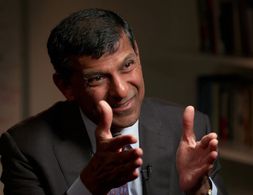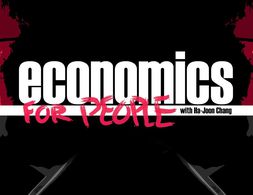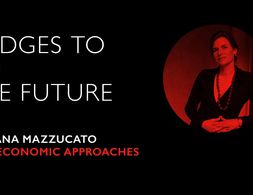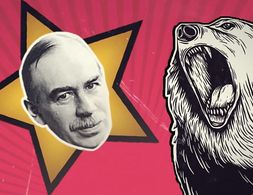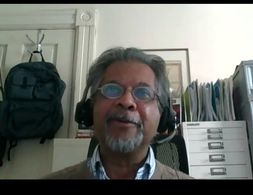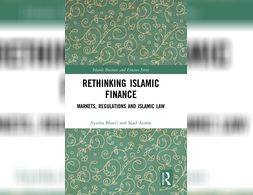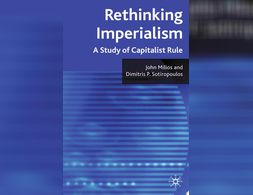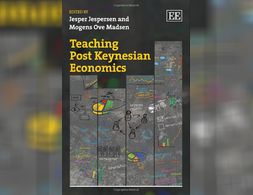✕
1198 results
The age of the contemplative economist-scholar—at home equally in classical languages, economic history, the history of ideas, and mathematical theory—has passed. The history of economics as a subdiscipline has lost touch with the mainstream study of economics. InThe Future of the History of Economics, internationally known scholars from ten countries provide a comparative assessment of the subdiscipline.
In this keynote speech, Roger Backhouse gives a historical overview of theories on secular stagnation: how it evolved from a description of the economic situation, especially in the U.S. of the 1930s to an analytical tool and then lost importance until its current revival. Backhouse touches upon the contributions of J. A. Hobson, Alvin Hansen, Evsey Domar and Paul Samuelson.
In this short video Peter Reich illustrates seven aspects of the state of the US economy. He provides suggestions on how to to get started to move towards a more fair distribution of wealth.
In this video, Rajan Raghuram highlights ‘A hereditary Meritocracy’. He identifies the “limitations” with the current economic systems of democracy and markets.
Economics has long been the domain of the ivory tower, where specialized language and opaque theorems make it inaccessible to most people. That’s a problem.
In this interview Mariana Mazzucato talks about economic actions governments need to take facing the Corona-crisis. Using the example of Britain, she argues that governmental bailouts need to be bound to commitment to sustainability.
In this podcast, Professor Darrick Hamilton critically discusses how current neoliberal economic models uphold a systemically racially unjust structure of economies.
An overview of the last century economic theories asking what makes a heterodox economist. This lecture focuses on the evolution of the various academic traditions in economics. Lavoie presents his own typology for categorising seminal work within the post-Keynesian tradition while leaving space to acknowledge that categories are not binary, but can be used to help understand the different traditions, and how they have developed over the last decades.
This blogpost discusses the bias the Economics discipline has towards Africa. It points out how important conferences on issues regarding Africa take place in Western countries at the expense of those based in Africa.
Looking for a pithy introduction into John Maynard Keynes's economic thinking? This BBC radio programme may be it.
This lecture was held in the context of the a two day conference called Which pluralism for thinking about how to achieve a more sustainable and resilient economy The practices institutions and system logics of today s economy are not suitable for appropriately addressing fundamental human needs The climate crisis …
Yao Graham, coordinator of Third World Network- Africa, reflects on lessons learned from past Economic Partnership Agreements (EPAs), specifically as they relate to the Post-Cotonou Agreement.
The article reviews the effects that the War in Ukraine will have for the global economy.
Jason Collins explains how his evolutionary approach to decision making relates to other approaches of behaviour This piece therefore not only serves as a good introduction to this evolutionary approach but also serves as a great introduction to these other approaches of behaviour namely neoclassical perfect rationality which involves mainly …
Photo by Kaitlyn Ashley on Unsplash The world is still feeling reverberations from the financial crisis of 2008 foreseen by neither politicians nor economists The history of capitalism has been punctuated by major crises exposing the fragility of our entire economic system How has capitalism despite these ruptures managed to …
This lecture course, which will be taught in English, will deal with gender issues in developing countries. After providing an overview of the gender differences in various aspects of welfare and economic life, the course will then tackle a number of specific issues.
Islamic finance's phenomenal growth owes to the Shariah compliant nature of its financial instruments. Shariah forbids the charging of interest (Riba) and instead promulgates risk-sharing and trade-based modes of financing. The Islamic financial industry has been subject to both critique and admiration. Critics argue that Islamic instruments (bearing debt-based structures) differ from their conventional counterparts only in legal lexicon and not in economic impact.
Part I: Basic Economic Problems Is Economics a Science? Is It Useful? (Lawrence Boland, Ian Parker) Is There Such a Thing as a Free Market? (William Watson, Robert Prasch) Part II: Consumers and Firms Is Homo Economicus an Appropriate Representation of Real-World Consumers? (Joseph Persky, Morris Altman) Is the Consumer Sovereign?
The Elgar Companion to Neo-Schumpeterian Economics surveys the achievements of the most visible scholars in this area. The contributions to the Companion give both a brief survey on the various fields of neo-Schumpeterian economics as well as insights into recent research at the scientific frontiers.
Mainstream economic theory has been increasingly questioned following the recent global financial crisis. Marc Lavoie shows how post-Keynesian theory can function as a coherent substitute by focusing on realistic assumptions and integrating the financial and real sides of the economy.
A Study of Capitalist Rule This book aims at presenting and assessing imperialism as a theoretical concept It aims to provide a comprehensive evaluation focusing specifically on the tension between Marx s theoretical system of the Critique of Political Economy and the theories of capitalist expansion and domination For over …
By focusing on the human side as well as the intellectual dimensions of how economists work and think, this collection of interviews with top economists of the 20th century becomes a startling and lively introduction to the modern world of macroeconomics.
Examine what would happen if we were to deploy blockchain technology at the sovereign level and use it to create a decentralized cashless economy. This book explains how finance and economics work today, and how the convergence of various technologies related to the financial sector can help us find solutions to problems, such as excessive debt creation, banks getting too big to fail, and shadow banking.
This book contends that post Keynesian economics has its own methodological and didactic basis, and its realistic analysis is much-needed in the current economic and financial crisis.
Despite some diversification modern economics still attracts a great deal of criticism. This is largely due to highly unrealistic assumptions underpinning economic theory, explanatory failure, poor policy framing, and a dubious focus on prediction. Many argue that flaws continue to owe much of their shortcomings to neoclassical economics.
Planetary Mine rethinks the politics and territoriality of resource extraction, especially as the mining industry becomes reorganized in the form of logistical networks, and East Asian economies emerge as the new pivot of the capitalist world-system.
Homo sapiens is now evolving into post economy The New Economy must manage scarcity and affluence a dual problem that is not integrated into the main classical economic theories There will be an important shock between opulence described by the economist John Kenneth Galbraith in The Affluent Society and scarcity …
It has become a contentious term in- and outside of economic policy: austerity. Allegedly the culprit behind the shortfalls of governments' reaction to the Great Financial Crisis, the policy makes for a spirited debate.
After long-time negligence, the Global South and the North-South divide are back on the agenda of development economics again. This book is a neat, accessible introduction into the topic, covering both the current situation and potential remedies from different points of view.
Written by the Nobel Prize winners in Economics Robert Shiller and George Akerlof, this book shows how deception and manipulation play a big role in the economic behavior of individuals, as well as showing how the assumption of "perfect information" is far away from the truth. Through both quantitative data and stories of how to reduce this noxious phenomenon, the authors paint a pretty different picture of how markets really works in a hyper-communicative scenario like nowadays.
Mr Minsky long argued markets were crisis prone His moment has arrived The Wall Street Journal In his seminal work Minsky presents his groundbreaking financial theory of investment one that is startlingly relevant today He explains why the American economy has experienced periods of debilitating inflation rising unemployment and marked …
Lean Logic is the late David Fleming’s masterpiece, the product of more than thirty years’ work and a testament to the creative brilliance of one of Britain’s most important intellectuals. A dictionary unlike any other, it leads readers through Fleming’s stimulating exploration of fields as diverse as culture, history, science, art, logic, ethics, myth, economics, and anthropology, being made up of four hundred and four engaging essay-entries covering topics such as Boredom, Community, Debt, Growth, Harmless Lunatics, Land, Lean Thinking, Nanotechnology, Play, Religion, Spirit, Trust, and Utopia. The threads running through every entry are Fleming’s deft and original analysis of how our present market-based economy is destroying the very foundations—ecological, economic, and cultural— on which it depends, and his core focus: a compelling, grounded vision for a cohesive society that might weather the consequences
Necesitamos cookies. Pincha en “Aceptar” para ayudarnos a hacer de Exploring Economics una mejor plataforma.




